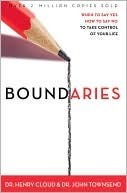More on this book
Community
Kindle Notes & Highlights
we inhabit our own souls, and we are responsible for the things that make up “
boundaries help us to define what is not on our property and what we are not responsible for.
We need help with the boulders—those times of crisis and tragedy in our lives.
Problems arise when people act as if their “boulders” are daily loads, and refuse help, or as if their “daily loads” are boulders they shouldn’t have to carry. The results of these two instances are either perpetual pain or irresponsibility.
it is very important to determine what “me” is, where my boundary of responsibility is and where someone else’s begins.
boundaries help us keep the good in and the bad out.
Confessing pain and sin helps to “get it out” so that it does not continue to poison me on the inside (1 John 1:9; James 5:16; Mark 7:21
God defines himself as a distinct, separate being, and he is responsible for himself. He defines and takes responsibility for his personality by telling us what he thinks, feels, plans, allows, will not allow, likes, and dislikes.
People with poor boundaries struggle with saying no to the control, pressure, demands, and sometimes the real needs of others. They feel that if they say no to someone, they will endanger their relationship with that person, so they passively comply but inwardly resent. Sometimes a person is pressuring you to do something; other times the pressure comes from your own sense of what you “should” do. If you cannot say no to this external or internal pressure, you have lost control of your property and are not enjoying the fruit of “self-control.
Honesty about who you are gives you the biblical value of integrity, or oneness.
Taking time off from a person, or a project, can be a way of regaining ownership over some out-of-control aspect of your life where boundaries need to be set.
Emotional distance is a temporary boundary to give your heart the space it needs to be safe; it is never a permanent way of living. People who have been in abusive relationships need to find a safe place to begin to “thaw out” emotionally.
If you have been in an abusive relationship, you should wait until it is safe and until real patterns of change have been demonstrated before you go back. Many people are too quick to trust someone in the name of forgiveness and not make sure that the other is producing “fruit in keeping with repentance
Forgive, but guard your heart until you see sustained change.
afraid that if they set boundaries they will not have any love in their life.
eat. God does not enable irresponsible behavior. Hunger
We may be moved with compassion to give to someone in need, but then this person manipulates us into giving more than we want to give. We end up resentful and angry, having missed something we needed in our own life. Or, we may want more from someone else, and we pressure them until they give in. They give not out of their heart and free will, but out of compliance, and they resent us for what they give. Neither one of us comes out ahead.
The Bible says to “own” your feelings and be aware of them.
But the point is, your feelings are your responsibility and you must own them and see them as your problem so you can begin to find an answer to whatever issue they are pointing
Parenting with love and limits, with warmth and consequences, produces confident children who have a sense of control over their lives.


